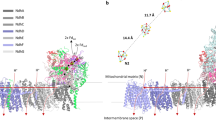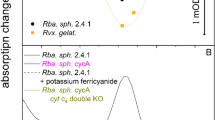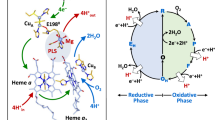Abstract
CELL respiration in eukaryotes is catalysed by the mitochondrial enzyme cytochrome c oxidase. In bacteria there are many variants of this enzyme, all of which have a binuclear haem iron–copper centre at which O2 reduction occurs, and a low-spin haem, which serves as the immediate electron donor to this centre1. It is essential that the components of the cell respiratory system have a high affinity for oxygen because of the low concentrations of dissolved O2 in the tissues; however, the binding of O2 to the respiratory haem–copper oxidases is very weak2,3. This paradox has been attributed to kinetic trapping during fast reactions of O2 bound within the enzyme's binuclear haem iron–copper centre2. Our earlier work3 indicated that electron transfer from the low-spin haem to the oxygen-bound binuclear centre may be necessary for such kinetic oxygen trapping. Here we show that a specific decrease of this haem–haem electron transfer rate in the respiratory haem–copper oxidase from Escherichia coli leads to a corresponding decrease in the enzyme's operational steady-state affinity for O2. This demonstrates directly that fast electron transfer between the haem groups is a key process in achieving the high affinity for oxygen in cell respiration.
This is a preview of subscription content, access via your institution
Access options
Subscribe to this journal
Receive 51 print issues and online access
$199.00 per year
only $3.90 per issue
Buy this article
- Purchase on Springer Link
- Instant access to full article PDF
Prices may be subject to local taxes which are calculated during checkout
Similar content being viewed by others
References
Babcock, G. T. & Wikström, M. Nature 356, 301–309 (1992).
Chance, B., Saronio, C. & Leigh, J. S. Jr J. biol. Chem. 250, 9226–9237 (1975).
Verkhovsky, M. I., Morgan, J. E. & Wikström, M. Biochemistry 33, 3079–3086 (1994).
Chance, B. J. gen. Physiol. 49, 163–188 (1965).
Petersen, L. C., Nicholls, P. & Degn, H. Biochem. J. 142, 247–252 (1974).
Puustinen, A. & Wikström, M. Proc. natn. Acad. Sci. U.S.A. 88, 6122–6126 (1991).
Puustinen, A. et al. Biochemistry 31, 10363–10369 (1992).
Morgan, J. E., Verkhovsky, M, I., Puustinen, A. & Wikström, M. Biochemistry 32, 11412–11418 (1993).
Svensson, M. & Nilsson, T. Biochemistry 32, 5442–5447 (1993).
Hill, B. C. & Greenwood, C. Biochem. J. 218, 913–921 (1984).
Oliveberg, M. & Malmström, B. G. Biochemistry 30, 7053–7057 (1991).
Lemieux, L. J., Calhoun, M. W., Thomas, J. W., Ingledew, W. J. & Gennis, R. B. J. biol. Chem. 267, 2105–2113 (1992).
Berry, E. A. & Trumpower, B. L. Analyt. Biochem. 161, 1–15 (1987).
Provincer, S. W. & Vogel, R. H. in Progress in Scientific Computing Vol. 2 (eds Deuflhard, P. & Hairer, E.) 304–319 (Birkhäuser, Boston,1983).
Author information
Authors and Affiliations
Rights and permissions
About this article
Cite this article
Verkhovsky, M., Morgan, J., Puustinen, A. et al. Kinetic trapping of oxygen in cell respiration. Nature 380, 268–270 (1996). https://doi.org/10.1038/380268a0
Received:
Accepted:
Issue Date:
DOI: https://doi.org/10.1038/380268a0
This article is cited by
-
Regulation of cytochrome c oxidase activity by modulation of the catalytic site
Scientific Reports (2018)
-
Cytochrome bd confers nitric oxide resistance to Escherichia coli
Nature Chemical Biology (2009)
Comments
By submitting a comment you agree to abide by our Terms and Community Guidelines. If you find something abusive or that does not comply with our terms or guidelines please flag it as inappropriate.



